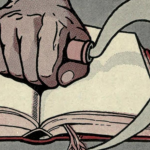Author and Auto-censorship

Max Nestelieiev responds to Joseph McElroy’s recent ebr essay, exploring how Soviet control enforced onto writers a self-censorship for which their work paid the price.
To allow censorship is a sign of totalitarianism. To prohibit censorship is a sign of democracy. What should an author do, when one can write about everything and what can an author write, when one is not allowed to do everything? Freedom requires certain restrictions, but does my freedom end where yours begins?
In Soviet times, writers got accustomed to censorship for so long, they resisted internally for such a long time that they cultivated in themselves an internal helper, their own censor, a peculiar Aesopian language for expression of the hidden by hints, paraphrases, analogies, and even anagrams or metaphors so complex that they turned into safes, the keys to which the safe-builders lost themselves, not to mention the readers. Auto-censorship (self-censorship) is the freedom of speech in a limited space of themes. The forms of self-censorship depended on time and restrictions, and it was always possible to write for the «drawer», hoping that there would be no frisk. Self-censorship is a form that determines the content. Struggling against the monster of censorship it is easy to turn into a monster, looking into the abyss of restrictions it is easy to restrict oneself only to this abyss as a form. The forms of self-censorship are different, as are the forms of the abyss, but the abyss remains an abyss.
To circumvent Soviet censorship a writer (Mandelstam is not an exception here) had to invent his/her own language, mainly guided not so by official prescriptions but by his/her own ideas about those prescriptions. The Soviet author was obliged to realistically describe socialism, so his/her style was called socialist realism. The Soviet writer was supposed to be an intellectual and an engineer, but this was not always possible, and one became an «underengineer» and a «half-intellectual.» One of the first writers who used the latter word was an outstanding Ukrainian author Yury Yanovsky (1902–1954), who wrote in a letter to his colleague-writer Mykola Khvylovy in 1929: «It’s not so painful that we are largely un-cultured, it`s possible to get rid of. It’s painful that there are too many half-intellectuals. A frail, prolific, unscrupulous, parasitic audience with a flexible backbone who neglect knowledge and culture, who harm the working class with a disregard for culture and live their lives, never seriously taking anything into account.» However, the fate of non-half-intellectuals was not too rosy. For example, Khvylovy shot himself in 1933, protesting against the arrests of his friends, and most of them were killed by the Soviet government in 1937 (the generation of Ukrainian artists liquidated that year is often called Executed Renaissance).
The half-intellectual author at long last always became both a bad engineer and a poor writer, but when in the time of glasnost Soviet authors were allowed (they allowed themselves) to print everything that was in their «drawers», it turned out that there were no extremely valuable artistic achievements storaged there. It turned out that self-censorship is worse than censorship, because you can not overcome internal restrictions so easily as the Berlin Wall or the prison bars. To be in captivity of their own reservations and prejudices is more terrible than among the artificial limitations. The state of hopelessness is self-restraint, when usual contra spem spero seems another delusion. Despair is the main cause of all suicides, because it is the realization of hopelessness. The sleep of reason produces monsters, and despair reproduces in the mind the thought of self-restraint, which may become an impulse to self-denial. “No, man is broad, even too broad, I would narrow him down» as said one of the F. Dostoevsky`s characters in his The Brothers Karamazov (translated by Richard Pevear and Larissa Volokhonsky).
Censorship, as well as self-censorship, is inseparable from politics, from that Other, exteriorized or interiorized, which interferes with our selection process, as does the Freudian Super-ego. How can one resist it then? What is the meaning of creativity, if not in this resistance, if not in asserting freedom, as it was formulated by the famous Russian philosopher Nikolai Berdyaev, born in Kyiv and one of the members of intelligentsia who was sent into exile on notorious «philosophers’ ships» in 1922.
The political situation also caused the well-known May 1968 events in France, when one of the mottoes of the students was Il est interdit d’interdire («It is forbidden to forbid»). Does not self-censorship always begin with this statement? Is it not that the author is always guided by the desire to «prohibit all prohibitions»? Is it not that every period (full point) is an attemp to supress, to self-censor, to say no more?
Joseph McElroy puts a rhetorical question in the end of his essay:«What is not censorship? Knowing perfectly well the difference between state censorship and the artist’s instinctive and exacting omissions, though knowing this how well?» And I’ve just tried to answer, knowing pretty well that some questions shouldn’t be answered and some questions probably should be even forbidden, but author literally means «one who causes to grow» (derived from Latin verb augere «to increase»). To be an author is to increase and therefore, too broad, I hope you won’t narrow me down, because I`ve already censored myself.
Cite this riposte
Nestelieiev, Max. "Author and Auto-censorship" Electronic Book Review, 5 May 2018, https://electronicbookreview.com/publications/author-and-auto-censorship/